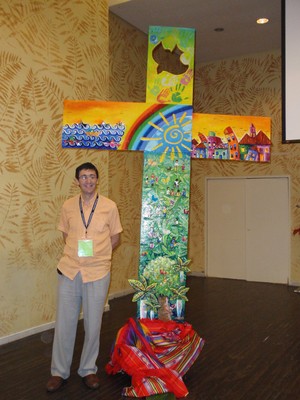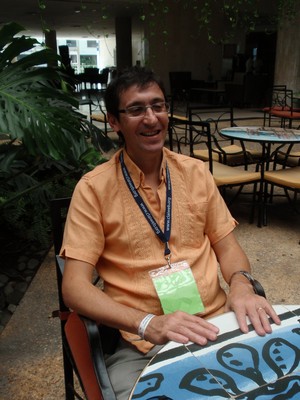The Rev. Dario Barolin knows firsthand what it’s like to be part of a religious minority.
A pastor in the Waldensian Church, a tiny branch of the Reformed tradition that has its roots in Italy, Barolin leads an alliance of Presbyterian and Reformed churches in predominantly Catholic Latin America.
That’s why he is passionate about helping Presbyterians and others appreciate what is unique and valuable about the Reformed way of being Christian.
Barolin, who lives in Uruguay, is executive secretary of the Alliance of Presbyterian and Reformed Churches of Latin America (AIPRAL), a group that includes Presbyterian, Reformed, Waldensian, and Congregational churches as well as the Moravian Church of Nicaragua.
Also active in the alliance are two Presbyterian Church (U.S.A.)-affiliated entities: the Synod of Puerto Rico and the Hispanic/Latino Presbyterian Caucus.
Barolin makes five or six trips a year to visit churches across a vast region that stretches from Mexico through Central and South America to the Spanish-speaking nations of the Caribbean.
While in Cuba to attend the Sixth General Assembly of the Latin American Council of Churches (CLAI), where he led one of the morning Bible studies, Barolin sat down with the Presbyterian News Service to talk about his work and about what it means to be part of the Presbyterian/Reformed tradition.
In addition to their geographical spread, the churches in AIPRAL represent a range of viewpoints on the ordination of women and other issues, Barolin says. “Some people say we are liberal. We are not liberal — we are open.”
Part of the purpose of the alliance, he adds, is “to help member churches become stronger in their Reformed identity.”
Many pastors are not well trained theologically, he explains. They don’t understand church government and may think the pastor is the head of the congregation, as in some non-Reformed denominations. They don’t understand the role of presbyteries.
AIPRAL sponsors regional training events for pastors and laypersons. Barolin would like to see the alliance produce electronic and print resources — perhaps starting with a simple, 10-page booklet on what it means to be a Reformed Christian.
Here’s what it means to Barolin: “We are a church that is very serious about the Bible and challenged by it,” he says. “But we also are open to human intelligence.” For example, he explains, “science and the Bible are not opposed but in dialogue.”
Another important emphasis of the Reformed tradition, says Barolin, is the equality of ministers and laypersons in church government.
Reformed Christians “have a good understanding of social issues, especially economic issues,” he adds.
Sixteenth-century Reformer John Calvin, for example, was ahead of his time in stressing “the responsibility of the church regarding poor people. He insisted on a just use of resources,” Barolin explains. Calvin understood that the world’s resources are limited and that if one person takes too much, others go without.
Barolin believes Calvin’s teachings are very relevant today — in a world in which people are told that “if they become richer and consume more they will become happier.”
Barolin grew up in Argentina, during a dictatorship that granted special privileges to the country’s Catholic majority. He remembers attending a public school decorated with statues of the Virgin Mary, where a priest would pop in regularly to remind the students to attend catechism classes at the Catholic church.
To a Waldensian, he says, such things were “a constant reminder that you are not part of the culture.”
With the rising influence of evangelical and Pentecostal denominations throughout Latin America, the Catholic church plays a less dominant role today, Barolin says. But Reformed Christian groups are still a tiny minority.

Dario Barolin, with the cross that is the centerpiece of the CLAI General Assembly. —Eva Stimson
Small churches, however, can still have a powerful witness. Barolin is pastor of a 40-member Waldensian congregation in the town of Fray Bentos, Uruguay. During his three-year tenure, the church has begun to attract new members with non-Waldensian backgrounds — former Catholics, Baptists, and Pentecostals.
A Catholic woman attending worship for the first time was struck by the open invitation to partake of communion. “She felt included,” Barolin says. “It was very moving for her.”
Others have found the Waldensian congregation to be a refreshing change from churches where pastors preach the “prosperity gospel” or are always asking for money.
Barolin also works part-time as professor of Old Testament at a seminary in Buenos Aires that is supported by nine denominations. During the semesters when he is teaching, he makes a four-hour bus trip across the border into Argentina for classes once a week.
He and his wife, also a Waldensian pastor, have two sons, ages 11 and 14.
Barolin says AIPRAL maintains a close fraternal relationship with the PC(USA) through Presbyterian World Mission. He has found PC(USA) mission personnel stationed in Latin America and the Caribbean to be valuable resources in his work.
On a more personal level, he says he is grateful for scholarships he received in the mid-1990s that enabled him to spend two months studying English at PC(USA)-related Maryville (Tenn.) College, followed by a year studying at Princeton Theological Seminary. After leaving Princeton, he spent 45 days helping with a Hispanic ministry and a soup kitchen sponsored by First Presbyterian Church in Bethlehem, Pa.
Recalling these opportunities, Barolin smiles when asked about his relationship with the PC(USA).
Without hesitation, he responds, “It’s a relationship of love.”
Eva Stimson, former editor of Presbyterians Today magazine, is a freelance writer and editor.

